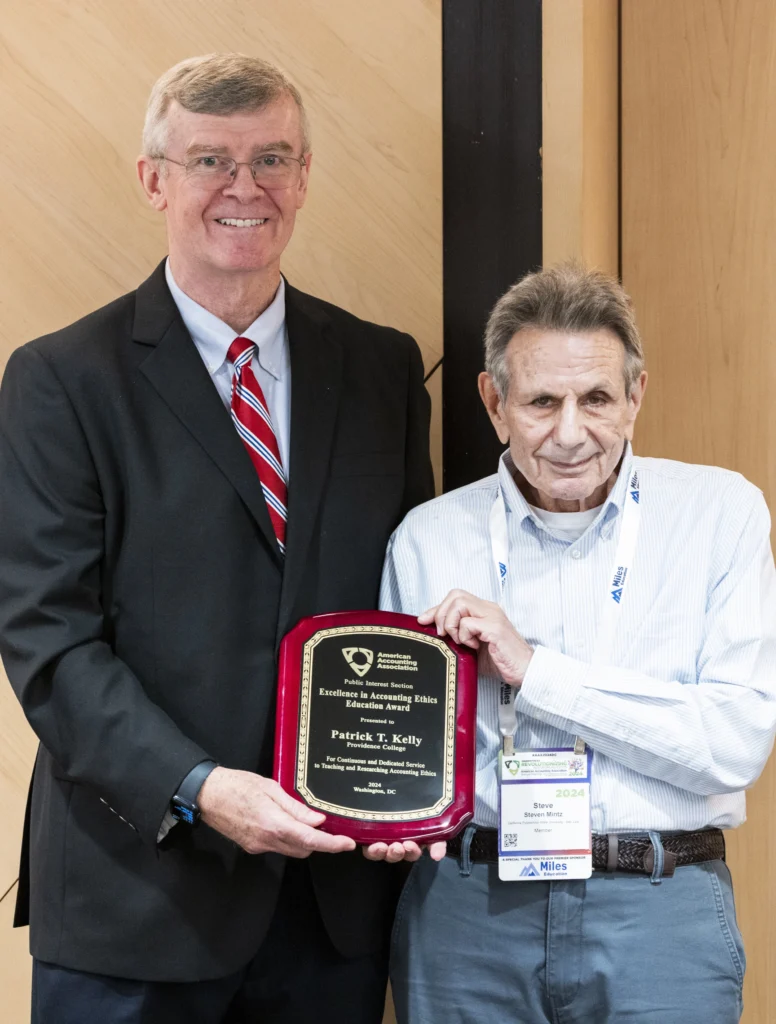Patrick Kelly, Ph.D, discusses problem gambling research after receiving $5,000 grant
By: Brady Manzanares ’25

Patrick Kelly, Ph.D., the Michael A. Ruane Professor of Accountancy, has been an impactful faculty member at Providence College since 2001, which he quantifies by the success of his students. There are students who he taught as accounting undergraduates who are now partners at Big Four accounting firms.
Kelly is the recipient of two recent accolades. He received a $5,000 grant from the Connecticut Council on Problem Gambling and was honored with the Excellence in Accounting Ethics Education Award by the American Accounting Association Public Interest Section.
Kelly explains that he became aware of the problem gambling grant and simply wanted to learn more. Instead of sending him the info, the Council invited him to apply. The funds helped him promote problem gambling awareness with the primary focus on sports betting, which Kelly recognizes as a prevalent issue among the college student demographic. With the help of the Personal Counseling Center and Rhode Island Lottery, he held a program in April expecting a few interested students to attend. Instead, 150 showed up. His work is already having an impact, and he hopes that the education around sports betting and problem gambling will continue to gain traction in the Providence College community.
Kelly first became aware of the detrimental impact of problem gambling in his hometown of Ledyard, Connecticut, where he delved more deeply into specific cases during a sabbatical in 2008. Cases of individuals with clean records motivated to steal from their workplace to support a gambling addiction occurred more often than expected. This finding led to “Casino Gambling and Workplace Fraud,” a paper Kelly published on the subject with his colleague, Carol Hartley, CPA, in 2010. It describes the important considerations managers within a 50-mile radius of a casino should address to prevent large financial losses. The paper has been referenced more than 125 times and downloaded over 2,100 times.
His research has focused on the addictive nature and shockingly powerful motivation behind gambling, which unfortunately can lead to tragic outcomes. People without so much as a parking ticket can be driven to steal hundreds of thousands of dollars from their workplace to support the addiction, he said.
He has also examined how aggressively states support casino revenues and expansions. “You can travel from Maine to Washington D.C and always be within a 50-mile vicinity of a casino,” Kelly said. States essentially compete for this revenue, as demonstrated by what has happened here in Rhode Island when it approved sports betting in 2018. People who could not gamble in neighboring states came here, bringing revenue to Rhode Island. This motivated neighboring states, Connecticut and Massachusetts, to legalize and expand gambling — and the cycle goes on across the country. The same trend has continued with online gambling.
This is why Kelly is worried about the current generation of college students. Instead of sitting in front of a slot machine, they are on a path to have an entire casino at their fingertips through the evolution of sports betting and online gambling on mobile devices, he said.
If he were riding to a casino with a student in an Uber, the first thing Kelly would point out is the environment that a person is entering.
“If we walk in and there is smoking, I recommend we leave,” he said.
He explained that the direct consequences of spending time in an establishment full of smokers should be considered.
Secondly, he simply said, “look around.” Casino facilities are frequently elaborate behemoths designed to make money, as demonstrated by the constant and rapid expansions of casinos such as Mohegan Sun and Foxwoods. It is you, the gambler, that pays for it all.
He emphasized that if someone wants to have a fun night at a casino, that is perfectly fine — if it is within your means. “Don’t bring the rent money to the casino,” Kelly stressed.
“Nobody ever walked into a casino and said, ‘I’m going to sign up to be a problem gambler,’” but it is the potentially addictive nature of gambling that leads a person down this path, he said.
Kelly is also the director of the Ethics in Business Education Program, which builds on the concepts that students first encounter through Development of Western Civilization courses. Every year, the program hosts the Michael Smith Regional Business Ethics Case Competition, in which teams of students examine a business ethics case and present their analysis to a panel of judges. The Providence College campus-wide competition will be held at the end of October. The topic of this year’s case is “GenAI in the College Classroom – Meeting the Ethical Challenges.”





